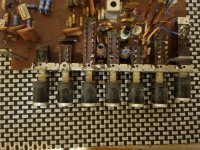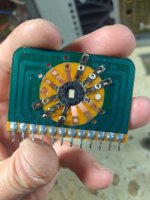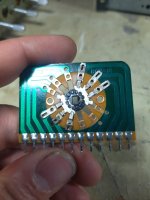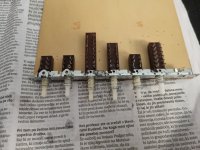Hy,
I want to use switches from 70s radio for my project. There will be no more high voltage running thru. It will be used with mcu analog read 0-5v.
I know that there are many many threads over the internet about what to use for cleaning and lubing the switches, but opinions are so different.
I'm including the picture of switches and stating that radio is from 70s in hope that type and materials will narrow down the options.
Can I use isop. alcohol or will it make the plastic brittle?
Can I lube the contacts with vaseline? There will be no real current flowing thru, so sparking wont happen.
Thank you
I want to use switches from 70s radio for my project. There will be no more high voltage running thru. It will be used with mcu analog read 0-5v.
I know that there are many many threads over the internet about what to use for cleaning and lubing the switches, but opinions are so different.
I'm including the picture of switches and stating that radio is from 70s in hope that type and materials will narrow down the options.
Can I use isop. alcohol or will it make the plastic brittle?
Can I lube the contacts with vaseline? There will be no real current flowing thru, so sparking wont happen.
Thank you
Attachments
The only way to truly get those sliding contact switches properly cleaned, is to remove the switch from the PCB, disassemble it, and clean. Then, you can properly clean the metal contacts with IPA, etc. Once clean, just a touch of 100% D4 on the contacts and reassemble. Just hosing the switch with ECC, IPA, D4, etc. just will not properly clean it.
Dan
Dan
I will do this, switches will go on another pcb anyway.
I'm looking for opinions about what products to use, because people have different opinions about what to use.
I'm thinking about what would be the best on the long run...
You know some say use IPA, others say don't use IPA because it will make the plastic brittle...
Some say use vaseline, it was used on new switches in the 50s... others say don't use it, it harden over time.
Some say use motor oil, others say don't use it, because it has zinc in it...
And so on and so on...
I'm really lost and always was on what is best to use.
Noted on D4 and IPA.
May I ask what is D4? Google finds various cleaners / products called D4.
I'm looking for opinions about what products to use, because people have different opinions about what to use.
I'm thinking about what would be the best on the long run...
You know some say use IPA, others say don't use IPA because it will make the plastic brittle...
Some say use vaseline, it was used on new switches in the 50s... others say don't use it, it harden over time.
Some say use motor oil, others say don't use it, because it has zinc in it...
And so on and so on...
I'm really lost and always was on what is best to use.
Noted on D4 and IPA.
May I ask what is D4? Google finds various cleaners / products called D4.
Noted on Deoxit.
Will inspect the contacts, I have another set of switches with broken parts and I will combine them.
Will inspect the contacts, I have another set of switches with broken parts and I will combine them.
Zdravím bratra!
In our area it's best to use combination of Kontakt 60, Kontakt WL and Kontakt 61, from KONTAKT CHEMIE, in this order. 60 dissolves oxides and sulfides, WL flushes, 61 conservates.
That being said, I find those old ISOSTAT switches hard to clean and rarely usable anymore.
In our area it's best to use combination of Kontakt 60, Kontakt WL and Kontakt 61, from KONTAKT CHEMIE, in this order. 60 dissolves oxides and sulfides, WL flushes, 61 conservates.
That being said, I find those old ISOSTAT switches hard to clean and rarely usable anymore.
Last edited:
Zdravo brat 🙂
We have Kontakt in our stores, I will use it.
I'm sure that I will be able to put something together, because I have two sets. If I manage to remove plastic knobs that is. I'm having a really hard time doing it, heat doesn't help much.
Hvala
We have Kontakt in our stores, I will use it.
I'm sure that I will be able to put something together, because I have two sets. If I manage to remove plastic knobs that is. I'm having a really hard time doing it, heat doesn't help much.
Hvala
They're tough on those. Maybe squirt of silicone spray or oil can help, if you don't want to cut them.Zdravo brat 🙂
We have Kontakt in our stores, I will use it.
I'm sure that I will be able to put something together, because I have two sets. If I manage to remove plastic knobs that is. I'm having a really hard time doing it, heat doesn't help much.
Hvala
Someone used Neostik on knobs (rubber based glue, really popular here with older generations -I hate it).
I ended by using two 10mm wrenches between the knobs and metal base to pull them apart, broked some knobs inside, but it's not too bad... I will fix that.
I ended by using two 10mm wrenches between the knobs and metal base to pull them apart, broked some knobs inside, but it's not too bad... I will fix that.
Thats really good. This is probably the product I will use all the time.Kontakt stuff is good, I use it all the time. Sometimes it does magic.
I would, but my project is to modify the radio with newer electronics.
And I need those switches in place.
I2c Fm tuner, motorised scale pointer for auto seek, bass reflex 2way speaker instead of OB fullrange, etc...
And I need those switches in place.
I2c Fm tuner, motorised scale pointer for auto seek, bass reflex 2way speaker instead of OB fullrange, etc...
I must do a search to see if I can find right ones - first five are linked, while last two are push in-push out type and I need them for tuner's DSP settings. In either case I will try to fix those and use them. They will be on seperate pcb and I don't mind etching another one as I do have 2 more toner transfers printed out.
I pulled one apart and contacts are good.
Who knows, if it worked for 50 years, it's nos and it might outlive the new ones, being questonable quality.
They work really smooth, I didn't expect to find that oxidation on them at all. They look bad but work really good.
I pulled one apart and contacts are good.
Who knows, if it worked for 50 years, it's nos and it might outlive the new ones, being questonable quality.
They work really smooth, I didn't expect to find that oxidation on them at all. They look bad but work really good.
I did the switches.Okay! It always depends on the environment they have faced over the years. I wish you luck!
The biggest one (UKV or FM) was used the most and it popped out sometimes after the refurbishment.
This would be the dead end if I wouldn't had another set, I replaced it and it is all good now.
They stay locked in no mather how careless I push them. Really smooth operation too.
Resistance is 0,0 ohm on all of them 🙂
I still have to do the power switch.
Attachments
[I want to use switches from 70s radio for my project]
Switches in vintage audio become unreliable when passing signals without a "wetting current". I think cheap switches would be ok if they activated a sealed relay which was designed for signal switching.
... https://en.wikipedia.org/wiki/Wetting_current
Switches in vintage audio become unreliable when passing signals without a "wetting current". I think cheap switches would be ok if they activated a sealed relay which was designed for signal switching.
... https://en.wikipedia.org/wiki/Wetting_current
- Home
- Design & Build
- Parts
- Cleaning and lubing old radio switches



